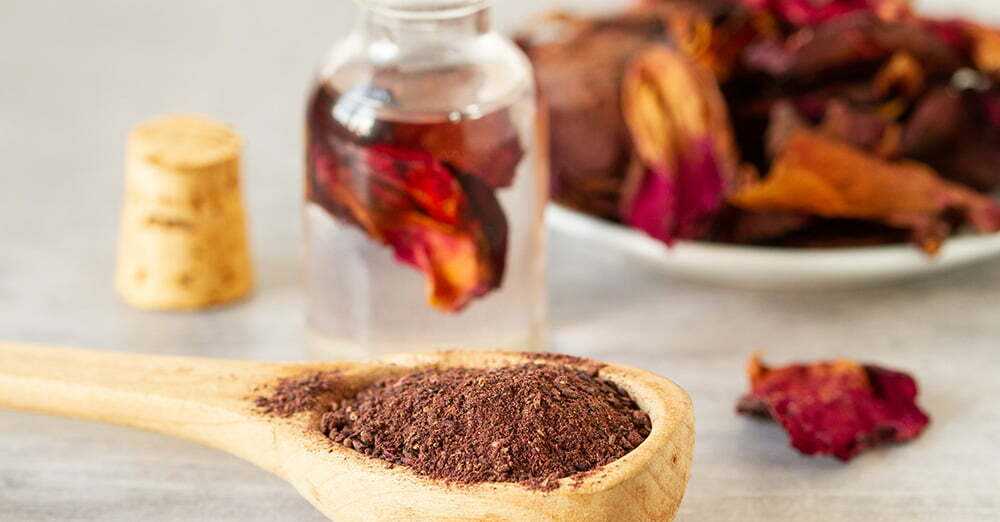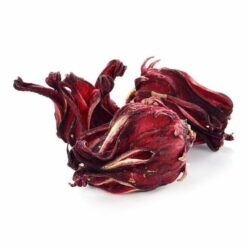Welcome to the world of hibiscus (also known as jamii ya bamia in Swahili), a flowery wonder from Africa that has been used for centuries in traditional medicine and beauty treatments. From its deep red petals to its refreshingly tart flavor, hibiscus has been treasured for generations as an important ingredient in many healthful recipes and natural cosmetics. But what exactly is hibiscus, and how has it become an integral part of the industry? Let’s explore the unique history, uses, and benefits of this vibrant flower.
Nutritional Composition of Hibiscus
Hibiscus is not just a beautiful flower (ua zuri); it also has an impressive nutritional composition (muundo wa lishe), making it a valuable ingredient in food, supplements, and topical beauty treatments. Here are some of the key components of hibiscus:
- Vitamins B and C
- Minerals such as potassium, calcium, and magnesium.
- Antioxidants like flavonoids, anthocyanins, and phenolic acids.
- Organic acids include citric, malic, and tartaric acids.
Overall, the nutritional composition of hibiscus is impressive and offers a range of health benefits. Incorporating hibiscus extracts into your diet or supplement regimen can boost your intake of essential vitamins and minerals and protect your body against oxidative stress and inflammation.
Health Benefits of Hibiscus
Hibiscus offers a plethora of health benefits, making it a valuable addition to your wellness routine. Let’s explore some of the remarkable advantages that hibiscus brings:
Cardiovascular Health
Hibiscus is known to have potential cardiovascular benefits. Research suggests that hibiscus extracts may help lower blood pressure and cholesterol levels. The bioactive compounds in hibiscus help relax blood vessels, promoting healthy circulation and reducing the risk of hypertension and heart disease.
Immune System Support
Rich in vitamin C and other antioxidants, hibiscus can bolster your immune system. These antioxidants help protect the body against free radicals and strengthen the immune response, reducing the risk of infections and supporting overall health.
Digestive Health
Hibiscus has traditionally been used to support digestion. The organic acids present in hibiscus, such as citric acid and malic acid, aid in digestion and may help alleviate digestive discomfort. Additionally, hibiscus has mild laxative properties, which can promote regular bowel movements.
Anti-Inflammatory Properties
Hibiscus contains compounds that possess anti-inflammatory properties. Regular consumption of hibiscus extracts may help reduce inflammation in the body, which is associated with various chronic conditions such as arthritis, obesity, and heart disease.
Hibiscus Applications in the Cosmetic Industry
Hibiscus has found its way into the cosmetic industry, offering a range of applications and benefits for skincare and haircare products. Let’s explore how hibiscus extracts are used in the cosmetic industry:
Anti-Aging Skincare Products
Hibiscus is renowned for its potential anti-aging properties. The antioxidants present in hibiscus extracts help combat free radicals, which contribute to skin aging. Incorporating hibiscus into skin care formulations such as creams, serums, and masks can promote a youthful appearance by reducing the appearance of fine lines, wrinkles, and age spots.
Moisturizing and Soothing Effects
Hibiscus extracts are known for their moisturizing and soothing properties. They can help hydrate the skin, retain moisture, and improve overall skin texture. Hibiscus can be used in moisturizers, lotions, and facial mists to provide hydration and relieve dryness, leaving the skin soft and supple.
Brightening and Even-Toning
Hibiscus extracts from Arfica contain natural acids that can promote a brighter and more even complexion. These extracts can be used in products targeting hyperpigmentation, dark spots, and uneven skin tone. Regularly using hibiscus-infused skincare products may help achieve a more radiant and uniform complexion.
Bottom Line
It’s important to note that while hibiscus offers numerous health benefits, individual results may vary. If you have any specific health concerns, it’s best to consult with a healthcare professional before incorporating hibiscus extracts into your routine.
Sources
Ajmera, R. (2023). 8 benefits of hibiscus. Healthline. https://www.healthline.com/nutrition/hibiscus-tea-benefits
Bodhare, D. A. (2022, November 10). Hibiscus: Uses, benefits, side effects, and more! PharmEasy Blog. https://pharmeasy.in/blog/ayurveda-uses-benefits-side-effects-of-hibiscus/
Dos Santos Nascimento, L. B., Gori, A., Raffaelli, A., Ferrini, F., & Brunetti, C. (2021). Phenolic compounds from leaves and flowers of hibiscus roseus: Potential skin cosmetic applications of an under-investigated species. Plants, 10(3), 522. https://doi.org/10.3390/plants10030522



